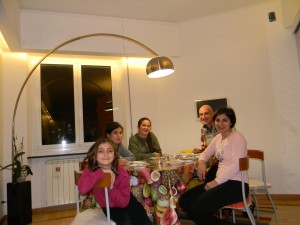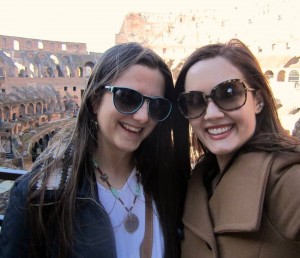This post actually comes a bit delayed. I wrote the post before leaving Italy, but I’ve now been in Thailand for about three weeks now. I’ve had difficulty uploading photos until now due to internet issues. I will do my best to get an up-to-date post about my travels here as soon as I can.
Learning English
A lot of people assume that anyone can teach their native language, but those who have studied a language (or even better those who actually teach a language) know that this is not true. In order to successfully teach a language, you have to understand the structure of the language, how you construct a sentence, and what rules you must follow in order to successfully express what you want to say. All those nit picky details that make a language sound right, but we don’t really know why. However, knowing all of this from my years of struggling to learn Spanish, I decided to spend the last month living with a family in Genoa, Italy with the goal of passing on some of my English knowledge to the 8 and 11 year old children.
Lucky for me the 11 year old, Valentina, already had a good understanding of the basic structure of the English language and we were able to focus mainly on expanding vocabulary and the conditional sentence structures. However, trying to explain the meaning of the word “unless” still proved difficult, and why sometimes you have to replace the verb “can” with “be able to” in order for it to properly function in a sentence. So I spent my mornings while Valentina was at school trying to learn the rules of the English grammatical structure so that I could explain to her the structures for building conditional sentences.
The younger girl, Bea, was not so easy. Being only 8 years old, not only was her English less advanced, but she wasn’t as confident as her sister so it was hard to pin down her level. However, once I finally did and created exercises for conjugating verbs in the present simple, I was shocked by how many different types of irregulars we have in our language. Not only are there certain verbs where you change the ending in the third person singular to -es instead of -s, there are some verbs that you don’t conjugate at all (might, should, would, could, etc). It made me think of the days when I sat in Spanish class complaining about all of the different irregulars that exist in the Pasado Perfecto, and realize that our language was probably as complicated, if not more so, for my teacher to learn.
I got to spend my evenings having a family dinner with all four of the family, giving me the chance to enjoy home-cooked Italian meals. 🙂 The father was so language obsessed that he probably knew more language than I did, and we often spent the meal switching between general conversations and debates on language structure. The experience was great and I was lucky to be with such a kind family, with children so willing to learn, but I definitely can say that I understand the struggle of a second language teacher so much better now than I did as a student.
While in Italy I also had the chance to sight see a bit and eat some delicious Italian food. I went to Cinque Terre, Pisa, and spent 5 days in Rome with one of my good friends from UPS who was on her way to study abroad in Italy. Rather than recount all of the details, I will point out the highlights with photos.





